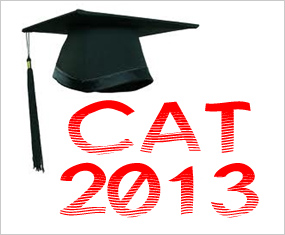CAT
2013 exam has two sections namely; Quantitative Ability and Verbal ability.
Quant section also comprises of Data Interpretation while Verbal section is
paired with Logical Reasoning.
Quantitative Ability:
The quantitative ability section of CAT tests you primarily on three areas
-- Arithmetic , Algebra and
Geometry .
Even if you are weak in the section, you must ensure that you score enough
marks that help clear the requisite cut off.
The new pattern of CAT offers time-bound sections of 70 minutes each. The
quantitative ability area will have 20 questions and 10 questions will be asked
from the data interpretation area. So, you need to plan accordingly.
Arithmetic:
Arithmetic is considered a weak area for many aspirants. Apart from algebra
and geometry, arithmetic is the area from which the maximum number of questions
comes in CAT.
Topics under arithmetic:-
The arithmetic area comprises averages, profit & loss, ratio and
proportion, percentages, time, speed & distance, number systems, simple
& compound interest, mixtures, progression, directions, etc.
Arithmetic is not only based on formulae, but can be identified with
day-to-day life as well. You can relate many of the problems on profit &
loss, percentage, time & distance, etc with your daily activity. If you are
weak in arithmetic, take up one topic every day, revise the concepts and
practice as many question as possible from that topic
Speed is an important factor in solving questions in arithmetic. The faster
you can read all the questions and select the ones you think you should
attempt; the better will be your chances of a good score.
Most CAT problems can be solved through multiple methods. So, make sure that
you are not using long methods. Lastly, practice speed calculation for 20
minutes a day.
Algebra:
Algebra is all about formulae and knowing which formula will be appropriate
for a particular problem
Topics under Algebra:-
The algebra section mainly consists of linear and quadratic equation,
logarithm, progression, binomial theorem, inequalities, permutation &
combination, probability, function, set theory, percentages, ratio proportion,
profit & loss.
As algebra is mostly formula-driven word problems, you should be thorough
with the basics and the formula first. As the first step of preparation, you
must know all the formulae by heart. Take a topic at a time and solve more than
50 questions on it. This will put you in a good state.
Always make it a point to revise things that you have already covered, but
do not exhaust yourself doing all these in the last few days
Algebra is meant to be tackled through answer choices. To choose the right option
in the questions, you need to follow the process of elimination (POE). If you
have a good grip over algebra, you can utilize the techniques such as
assumption and substitution .
Geometry:
Most of the test takers are perturbed with the Geometry section. It
can be considered as a tough area for many, if you are not clear conceptually
or do not know the right application methods.
Topics of Geometry:-
Geometry part consists of the topics such as Lines, Angles, Triangles,
Polygons, Circles, Mensuration, Trigonometry and Co-ordinate Geometry.
Equations (linear + Quadratic), Series & Sequences, functions, Triangles,
Circles, are more important of these.
Preparation strategy for Geometry:-
Like every other section, improvement in geometry section depends on
practice. Geometry is about shapes. The best way to handle Geometry is to draw
the figure to scale and then visually analyze the problem.
One should focus only on geometry for a week. On Day 1, go through theorems
on Triangles. On Day 2 and Day 3, solve all Geometry questions from study
material first and then past CAT and XAT papers. Study the theorems on circles
and polygons on Day 4. On Day 5, 6 and 7, solve all problems from circles and
polygons
Books for Quantitative Ability :-
• The NCERT Maths Books of Class 8 to 10
• Any one of the following books by R.S.
Agarwal: Objective Arithmetic, Mathematics for MBA, Quantitative Techniques
• ‘How to Prepare for Quantitative Aptitude
for CAT' by Arun Sharma
• ‘The Pearson Guide to Quantitative
Aptitude for the CAT' by Nishit Sinha
• ‘Quantitative Aptitude for MBA Entrance
Examinations' by Abhijit Guha

No comments:
Post a Comment